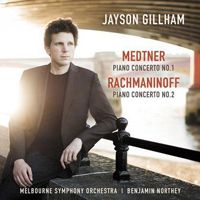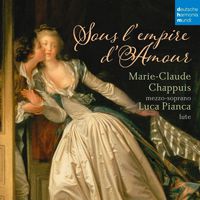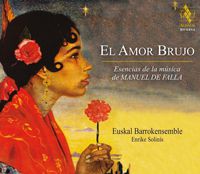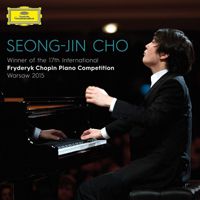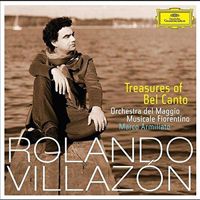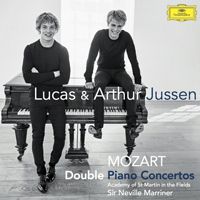RECOMMENDED NEW CLASSICAL MUSIC
Medtner: Piano Concerto No. 1 / Rachmaninoff Piano Concerto No. 2 by Jayson Gillham, MSO and Benjamin Northey
‘I love discovering new (but old and forgotten) composers and their long-neglected compositions. Everyone knows Rachmaninoff, his famous piano concertos (the second of which is on this album) and symphonic works. However, one of his closest friends, Nikolai Medtner, was also a composer. The pair often dedicated pieces to each other. Rachmaninoff’s music is stupendously famous and consistently performed, while Medtner has languished in obscurity. A number of high-profile musicians have tried to reignite interest in this composer over the years and after listening to this album on repeat for the last few days, I can only hope Medtner’s works will be recorded more frequently, as I’ve fallen in love.
Medtner was a proficient piano player, which meant he included piano as a major instrument and tonality in all his compositions. What’s interesting about his style is that several of his major works, including many sonatas and his piano concertos, are large single-movement works. There are seamless transitions between the musical ideas, and it takes a couple of listens before you truly get how the musical ideas all fit together. This album is dedicated to his mother (his original piano teacher). The soaring string section takes the virtuosic opening piano ideas and spreads them around. With clear influences from Rachmaninoff in tonality and melody, you still wouldn’t mistake Medtner for anyone but himself.
The other bonus to this recording is the fact that it is performed by an all-star Australian cast. Our very own Melbourne Symphony Orchestra, under assistant conductor Benjamin Northey, with the internationally renowned piano soloist Jayson Gillham, pull together to create a beautiful rendition of the beloved Rachmaninoff Piano Concerto No. 2 along with Medtner’s Piano Concerto No. 1 and a sweet Medtner Prelude breaking up the epic symphonic works.
(As a footnote for the book nerds, Philip Pullman said Medtner was his favourite composer in an interview in 2011.)’
– Kate Rockstrom
Sous l'empire d'Amour by Marie-Claude Chappuis and Luca Pianca
‘French musicologist Marin Mersenne (1588–1648) declared the French air de cour to be lacking the passion of Italian vocal music. ‘Our French musicians,’ he wrote, ‘are content to flatter the ear and to avail themselves of a perpetual sweetness in their singing, which prevents them from ever becoming over-forceful’. In Sous l’Empire d’Amour, mezzo-soprano Marie-Claude Chappuis and lutenist Luca Pianca present a selection of beguiling and haunting airs de cour to challenge Mersenne’s statement. Popular in Louis XIII’s court, the French air de cour is a form of secular vocal music, often strophic, homophonic, and with single lute accompaniment. As someone relatively unfamiliar with that repertoire, I listened to the album with curiosity.
Chappuis and Pianca’s program comprises music by famous composers (Lully, Lambert), alongside lesser-known composers (Jacques Bittner, Gabriel Battaile). Chappuis’s mezzo-soprano voice is dark, expressive, and agile, her delivery of text seductive, and her dramatic interpretations alternately outrageous and coquettish. Chappuis and Pianca’s sound world is melancholic, and provides the perfect escape during an otherwise cold and miserable Melbourne week. Without hesitation, I declare Mersenne’s assertion misguided, and, in the hands of Chappuis and Pianca, the air de cour an art form capable of expressing our most passionate human emotions.’
– Alexandra Mathew
Falla: El Amor Brujo by Euskal Barrokensemble, María José Pérez and Enrike Solinís
‘Manuel de Falla’s legacy is a study in contradictions. Although Spanish-born, Falla spent seven years in Paris, where he greedily consumed the music of Ravel and Debussy, and marvelled at colourful spectacles at the Ballets Russes. In France, Falla was admired for his Spanish sound palette, but at home he was criticised for his susceptibility to foreign influences. Nowadays, his music is most famous for inspiring Miles Davis’s Sketches of Spain. In El Amor Brujo, Euskal Barrokensemble (under Enrike Solinís) has at last repatriated Falla, recording fiery folk-inspired arrangements of Falla’s compositions alongside those of Tárrega and Rodrigo.
Flamenco singer María José Pérez plays a starring role. I have listened to (and loved) a number of recordings of Falla’s vocal music, and it took some time for my ears to adjust to Pérez’s comparatively rustic, guttural voice. But what she lacks in refinement, she makes up for in passion. While the stereotypically flamenco-sounding Cancion del Fuego Fatuo is not to my taste (Victoria de los Ángeles’s interpretation remains unsurpassed), Pérez’s effervescent voice sounds well in the colourful vocal arrangement of Concierto de Aranjuez (first two movements). With Euskal Barrokensemble as your guide, allow yourself to be transported to Falla’s Spain.’
– Alexandra Mathew
CLASSICAL SPECIALS IN AUGUST
Winner of the 17th International Fryderyk Chopin Piano Competition 2015 by Seong-Jin Cho
$12.95 (), only while stocks last
‘Seong-Jin Cho has certainly made his mark – this is as fine a debut as any young artist could wish for. If there’s any justice, we should be hearing a lot more from him in the coming years!’ – David Smith, Presto Classical
Treasures of Bel Canto by Rolando Villazon
$12.95 (), only while stocks last
‘It is always a pleasure to listen to Rolando Villazon, who brings passion and commitment to whatever he sings, and this latest disc of 16 bel canto songs by Bellini, Donizetti, Rossini and Verdi is rich in lovely melody.’ – Carla Maria Verdina-Sullwold, Fanfare
Mozart: Double Piano Concertos by Lucas and Arthur Jussen
$12.95 (), only while stocks last
‘The cadenza in K365’s opening movement ends with a chromatic scale over three and a half octaves, split between the two pianos, and I swear you can’t hear the join. Those moments where the two pianos toss a motif between each other sound for all the world like a single instrument.’ – Gramophone


